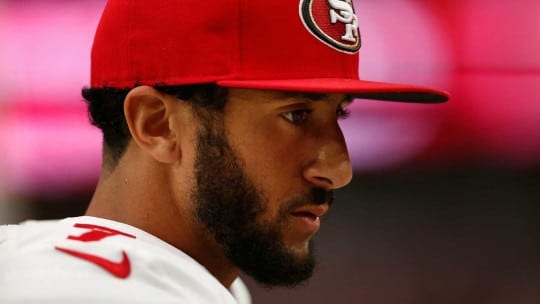
Without question, being a public figure means a life in the spotlight (at least for as long as your particular star is shining). Many notable figures use their position as a sort of bully pulpit to take a stand on issues—think Matt Damon and water, Angela Jolie and human rights, Willie Nelson and small, independent farms.
Many public figures have made significant contributions, over a number of years, to charitable causes. Some work behind the scenes, not seeking accolades for their effort, hoping that simply attaching their name to a cause will generate dollars, awareness or change.
There is a fine line, however, between adopting a social issue and taking a position on something so controversial that it quickly escalates from good intention to crisis.
There is an example worth considering in the recent actions of San Francisco 49ers' quarterback Colin Kaepernick, who on Aug. 26 refused to stand during the National Anthem to protest the treatment of minority communities in the U.S. While the defense of civil rights is a critical societal issue, Kaepernick created a media firestorm. After a team meeting Aug. 28, Kaepernick and his teammates responded to the controversy that developed from the protest.
"This could be the type of thing that creates division if you let it," 49ers safety Antoine Bethea said. "That's not why we are here. We are here to win football games and we are going to stick together."
The meeting was called so that 49ers players and staff could have a discussion about Kaepernick's actions, according to an NFL Media report. While many players across the NFL have commented on both sides of the protest, the 49ers stressed unity and understanding after the meeting.
Kaepernick’s protest was perceived as anti-American by many, no matter how well intentioned. Some believed that his sitting during the National Anthem was disrespectful to members of the armed forces and their families. Fans even resorted to publicly burning Kaepernick’s football jersey.
In response to the anti-American criticism levied against him, Kaepernick clarified his reasoning to NFL Media after the team meeting.
"I have great respect for men and women that have fought for this country," Kaepernick said. "I have family. I have friends that have gone and fought for this country. They fight for freedom. They fight for the people. They fight for liberty and justice for everyone. And that's not happening. People are dying in vain because this country isn't holding their end of the bargain up as far as, you know, giving freedom and justice and liberty to everybody."
Following Kaepernick's initial on-the-field actions, both the NFL and the 49ers released statements saying that it's not mandatory for players to rise for the National Anthem. The 49ers specifically recognized the significance of the pregame ritual, while also respecting Kaepernick's freedom of expression: "The national anthem is and always will be a special part of the pre-game ceremony. It is an opportunity to honor our country and reflect on the great liberties we are afforded as its citizens. In respecting such American principles as freedom of religion and freedom of expression, we recognize the right of an individual to choose and participate, or not, in our celebration of the national anthem."
So given the number of celebs who lend their name to causes, what makes this one different? While this essay is not intended to determine the rightness or wrongness of Kaepernick's actions, from a communications perspective, here are things PR pros should consider if someone from your organization is preparing to make a political statement:
- Will the statement incite audiences or generate further support for the issue?
- Does the public position influence the appropriateness of the action?
- Are the actions defensible to reasonable audiences?
- Is the environment such that the message will be well received?
- How will it touch those around the person making the statement, such as employers, sponsors (think Lochte) or others?
- Does the statement create an opportunity to advance the issue, or does it simply widen the divide?
Hinda Mitchell is president of Inspire PR Group.
